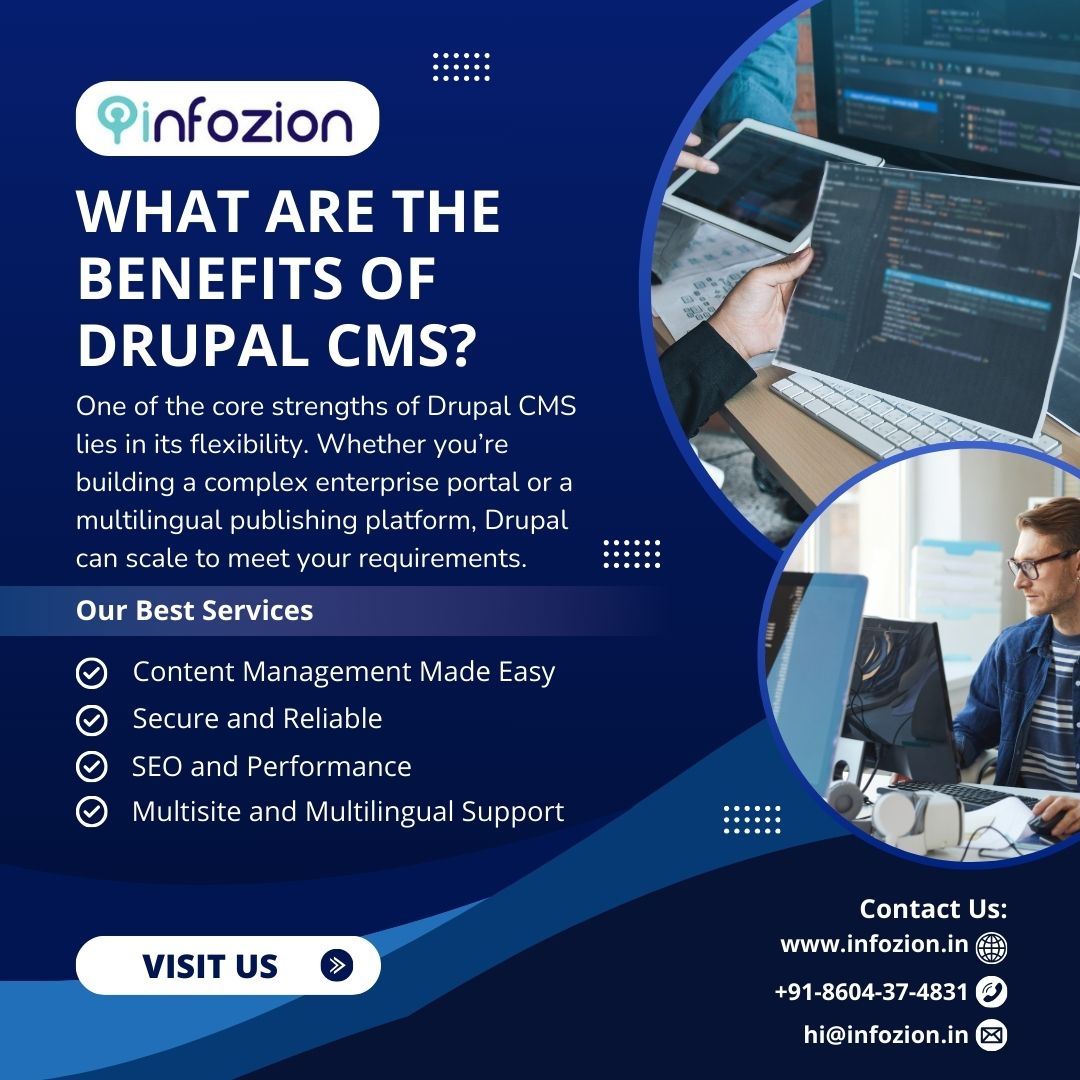Drupal CMS: Simplifying the Future of Web Development

Drupal CMS: Simplifying the Future of Web Development
Drupal CMS: Simplifying the Future of Web Development
In today’s fast-paced digital era, websites need to be more than just online brochures. They must deliver dynamic, personalized, and secure experiences to users. Exploring Drupal CMS highlights how this powerful platform is reshaping web development for businesses aiming to stay ahead of the curve.
Why Do Businesses Need Drupal CMS?
For modern enterprises, managing complex content across multiple platforms can be a challenge. Drupal CMS offers a solution tailored for scalability, flexibility, and security.
Unlike many traditional CMS platforms, Drupal is ideal for organizations with large content structures, diverse user roles, or multilingual needs. From universities and governments to startups and enterprises, businesses choose Drupal because it helps them grow without constraints. It supports advanced workflows, allows content reuse across channels, and offers powerful permission systems—crucial for teams working collaboratively.
Why Drupal CMS is Important
The importance of Drupal CMS goes beyond content management. It serves as a robust digital experience platform that adapts to both current and future web development needs.
Drupal’s open-source nature empowers businesses with freedom—no licensing fees, complete customization, and a large support community. Its API-first architecture allows seamless integration with third-party tools and mobile applications. With constant updates and a focus on modern development trends like headless CMS and responsive design, Drupal remains a forward-thinking choice.
What Are the Benefits of Drupal CMS?
One of the core strengths of Drupal CMS lies in its flexibility. Whether you’re building a complex enterprise portal or a multilingual publishing platform, Drupal can scale to meet your requirements.
Content Management Made Easy
Drupal offers custom content types, structured taxonomies, and intuitive editorial workflows. Teams can manage and publish content faster, ensuring consistent quality across platforms.
Secure and Reliable
Drupal is trusted by high-profile institutions worldwide. Regular security audits and a vigilant community ensure that vulnerabilities are patched quickly, keeping your site safe from threats.
SEO and Performance
With features like clean URLs, customizable metadata, and mobile responsiveness, Drupal sites are well-optimized for search engines. It also handles high traffic smoothly with built-in caching and performance tuning tools.
Multisite and Multilingual Support
Businesses operating across different regions benefit from Drupal’s ability to manage multiple sites and languages under a single dashboard. This reduces operational complexity while enhancing global reach.
Exploring Drupal CMS: Key Advantages
Drupal CMS stands out for its:
- Customizable content structures
- Advanced user and role permissions
- Built-in multilingual capabilities
- Strong focus on security and compliance
- Scalable architecture for high-growth businesses
Final Thoughts
Exploring Drupal CMS reveals that it’s more than just a content management tool—it’s a future-ready platform designed for innovation and scalability. With its open-source foundation, enterprise-grade features, and active developer community, Drupal is shaping the future of how businesses build and manage their digital presence.
Whether you’re launching a corporate website, an online community, or a global content hub, Drupal CMS provides the tools and flexibility to turn your vision into reality.
Looking to implement Drupal for your next project? Infozion Technologies offers expert Drupal development services to help you build secure, scalable, and feature-rich digital experiences.
What is Drupal?
Drupal is a powerful, open-source Content Management System (CMS) used for building and managing websites. Known for its flexibility and scalability, Drupal is a preferred choice for businesses, developers, and organizations requiring a robust digital presence. It is particularly popular for government, educational, and enterprise-level websites due to its security and customization capabilities.
Why You Should Use Drupal CMS
Choosing the right CMS is crucial for managing your website effectively. Drupal stands out because of its ability to handle complex content structures while offering a high degree of flexibility. Unlike other CMS platforms, Drupal allows for deep customization without compromising performance or security. It is a perfect choice for websites requiring strict security measures, large-scale content management, or multilingual capabilities.
Drupal is designed for scalability, making it suitable for both small websites and large enterprise portals. The CMS supports extensive content types, media integration, and workflow automation. With a vast community of developers contributing to its improvement, Drupal continuously evolves, ensuring websites remain modern and efficient.
What Are the Benefits of Drupal CMS?
Drupal offers a highly customizable content management experience. The platform provides a structured approach to organizing content, making it easier to manage even the most complex sites. With its built-in caching and performance optimization features, Drupal ensures that websites load quickly, enhancing user experience and SEO rankings.
Security is another major advantage of Drupal. Many government agencies and large enterprises rely on it because of its stringent security protocols. Regular updates and a proactive security team help protect websites from potential threats. Additionally, Drupal supports multilingual capabilities, allowing businesses to reach a global audience with ease.
Another significant benefit is the ability to create custom workflows and permissions. Drupal allows businesses to define roles for different users, ensuring secure content management and collaboration. Whether you are a content creator, editor, or site administrator, Drupal provides tools to streamline content publishing and maintenance.
How to Use Drupal CMS
Installing and Setting Up Drupal
To get started with Drupal, you need to install it on a web server. First, download the latest version from the official website and set up a web server environment with PHP and a database like MySQL or PostgreSQL. The installation wizard will guide you through setting up the site, including configuring basic settings such as site name, administrator credentials, and database connections.
Once the installation is complete, you can begin customizing your website by selecting a theme that fits your brand identity. Drupal provides a variety of themes that can be further customized using CSS and template files. The administrative dashboard allows you to manage settings, configure site functionality, and install additional modules to extend capabilities.
Managing Content in Drupal
Drupal provides a structured approach to content management. You can create different content types such as articles, blog posts, or product listings. The built-in text editor simplifies formatting, while media management tools allow you to upload and organize images, videos, and documents efficiently.
Drupal’s taxonomy system enables you to categorize and tag content for better organization. By setting up menus and blocks, you can create an intuitive navigation structure that enhances user experience. With the help of modules like Views, you can create dynamic content displays, such as featured posts or recent updates, without needing advanced coding skills.
Optimizing Drupal for Performance and SEO
Drupal comes with built-in caching mechanisms that improve site performance. Additionally, enabling clean URLs and installing SEO modules can enhance search engine visibility. Adding meta descriptions, alt text for images, and XML sitemaps ensures that your website is indexed properly by search engines.
Regular updates are essential for maintaining security and performance. Drupal’s community actively releases security patches and updates, which should be applied promptly to prevent vulnerabilities. Backing up your website periodically is also recommended to safeguard data and configurations.
By following these steps, you can efficiently build and manage a Drupal-powered website tailored to your specific business needs.





